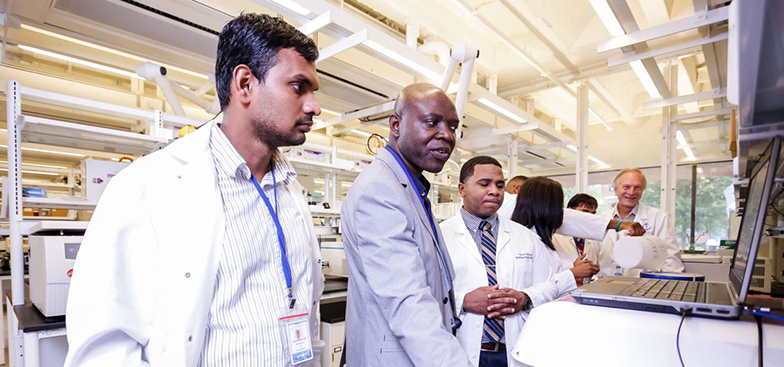Data Science
Morehouse School of Medicine is leveraging the integration of big data to expand scientific discovery and new knowledge with a lens toward achieving the vision of leading the creation and advancement of health equity. Data integration supports bioinformatics, preclinical and clinical research, health care, predictive medicine and population health, as well as community engagement, user training, education and data science.
Biomedical Informatics Unit
MSM is gaining insights in ways to improve population health and health care through its medical informatics education and research programs that utilize data science principles to integrate data across the spectrum of translational research.
The integrated Biomedical Informatics Unit (BIU) focuses on the integration of MSM and affiliated health information systems into a repository that connects with other systems and platforms. The unit places particular focus on the integration of:
- electronic medical
- personal health records
- patient datasets with other research databases from the lab (basic sciences)
- the bedside (clinical sciences)
- the community (population health)
The goal: Establish an integrated standards-based informatics platform to support MSM clinical and translational research investigators work and share research information with other investigators and collaborators.
The i2b2 Platform
Funded by the National Institutes of Health’s National Center for Biomedical Computing, the i2b2 platform is the building block of the BIU’s data repository. The i2b2 platform stands for “Informatics for Integrating Biology and the Bedside.” The platform is a scalable informatics framework that bridges health care data, patient-centered outcomes data, clinical research data and the vast data banks arising from bioinformatics and basic research to better understand the genetic bases of complex diseases. This knowledge will greatly enhance the future of health care by facilitating the design of targeted therapies for patients with genetic diseases.
This linked data will serve as a major institutional resource for advancing
- clinical/translational research
- enhancing career development for clinical/translational research
- community health
- health services/outcomes
- clinical trials
Leveraging Rich Data Assets
The National Center for Primary Care has been developing secondary data analysis with one of the largest Medicaid claims databases in the country. This robust dataset represents over 90 percent of minority Medicaid enrollees and 80 percent of all Medicaid enrollees. Work with Medicaid claims data has resulted in over 30 peer-reviewed publications. This database has been merged with zip code-level health system, environmental, and sociodemographic variables and used statistical methods to explore the interplay of these factors in promoting or reducing health disparities. The data is a resource for student and faculty research, and resource for informing training programs and classes for the AUC’s new Data Science Institute.
The Use of Data to Achieve Health Equity
Through the Office of Integrated Planning and Decision Support, MSM is using big data – structured and unstructured – to answer the most pressing questions that lead to health equity. MSM is acquiring the team of experts and building an enterprise data warehouse to capture, integrate, analyze and gain predictive-modeling insights for strategic decision making. In so doing, leveraging the data assets in research, clinical and educational portfolios, coupled with other external datasets that include social determinants of health.


